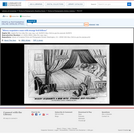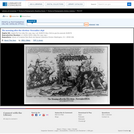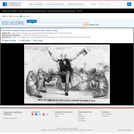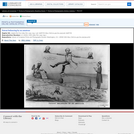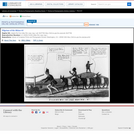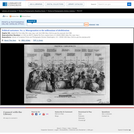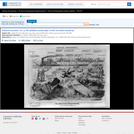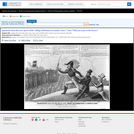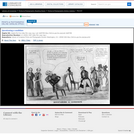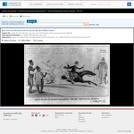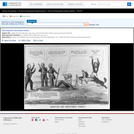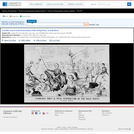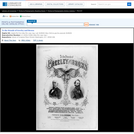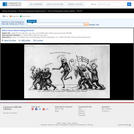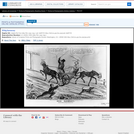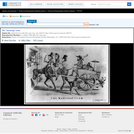Lincoln's support of abolition is portrayed here as a liability in his race to the White House against Democratic candidate George B. McClellan. At top a smoothly run train "Union" heads straight for the White House. The engine is labeled "Democracy" and the first car, in which McClellan stands in the role of engineer, flies a flag "Constitution." The other cars are labeled "Union" and are occupied by happy, cheering Democrats. McClellan taunts, "Wouldn't you like to swap horses now? Lincoln?" (probably a reference to Lincoln's replacement of him as commander of the Army of the Potomac). Several of his passengers comment on the wreck of the Republican train below: "H-ll, H ll, I'm used to Railroad accidents but that beats Vibbards all to smash." New York governor Horatio Seymour: "I thought little Mac could take the train through better than I could." "It's no use talking Ben [Union general Benjamin F. Butler]! I told you I was on the right train . . . thunder there's John McKeon [prominent Democrat and New York lawyer ] with us." "Little Mac is the boy to smash up all the Misceganationists." "Politics does make strange bed fellows . . . the d . . . l if there aint Fernandy!" "Fernandy" is Fernando Wood, prominent Peace Democrat and mayor of New York. "Good-bye Horace [Horace Greeley]! Nigger on the brain flummoxed you." "Thus ends the Abolition Party!" "Be the powers the gintleman with his pantaloons in his bootleg is having a high time of it." "Good-bye old Greenbacks!" to Salmon P. Chase, who leaves with a satchel at right. Chase, who resigned his post as secretary of the treasury on June 29, says, "Thank God, I got off that train in the nick of time." In contrast, Lincoln's train, below, is far behind after having crashed on rocks "Confiscation," "Emancipation," "$400,000,000,000 Public Debt," "To Whom It May Concern," and "Abolitionism." Lincoln himself is hurled into the air, and says, "Dont mention it Mac, this reminds me of a . . ." This reference is to Lincoln's rumored penchant for telling humorous stories at inappropriate moments. (See "The Commander-in-Chief Conciliating the Soldier's Votes," no. 1864-30.) "Tribune" publisher and abolitionist Horace Greeley, also in the air, says, "I told you Abe that 'To whom it may concern' would be the death of us." (See "The Sportsman Upset by the Recoil of His Own Gun," no. 1864-31.) A black man crushed in the wreck accuses Lincoln, "Wars de rest ob dis ole darkey? Dis wot yer call 'mancipation'?" Another black man hurtles through the air, retorting, "Lor Amighty Massa Linkum, is dis wot yer call 'Elewating de Nigger'?" Secretary of War Edwin Stanton, hanging out of the train, moans, "Oh! dear! If I could telegraph this to Dix I'd make it out a Victory." Preacher and abolitionist Henry Ward Beecher holds a black child to his breast and prays, "Oh! my brethering! Plymouth Church will try to save the Platform." The notorious Union general Ben Butler exclaims, "H--ll! I've Preyed $2,000,000 already!" The four clean-shaven men in the train are identifiable as Massachusetts senator Charles Sumner, New York journalist and state political leader Thurlow Weed, Secretary of State William Seward, and John McKeon. Sumner: "Say Seward will praying save us?" Seward: "Oh! I'm a goner! Ask Thurlow, he's my spiritual Adviser." Weed: "Pray! yes, pray Brother, Butler will lead." At left Maximilian, puppet emperor of Mexico, confers with John Bull and Napoleon III of France, saying, "Oh Main Got'vi I vas send over to dis land of Greasers to pe chawed up py de Yankees." John Bull's opinion is ". . . This will never do. The Monroe doctrine must be put down." Napoleon III says, ". . . by Gar, if dat train gets to de White House, its all up with my Mexico." During the Civil War, Napoleon III tried to establish a puppet state in Mexico under Emperor Maximilian. At bottom left are prices and ordering instructions for obtaining copies of the print.|Entered . . . 1864 by Bromley & Co. New York.|Title appears as it is written on the item.|Weitenkampf, p. 146.|Forms part of: American cartoon print filing series (Library of Congress)|Published in: American political prints, 1766-1876 / Bernard F. Reilly. Boston : G.K. Hall, 1991, entry 1864-39.
